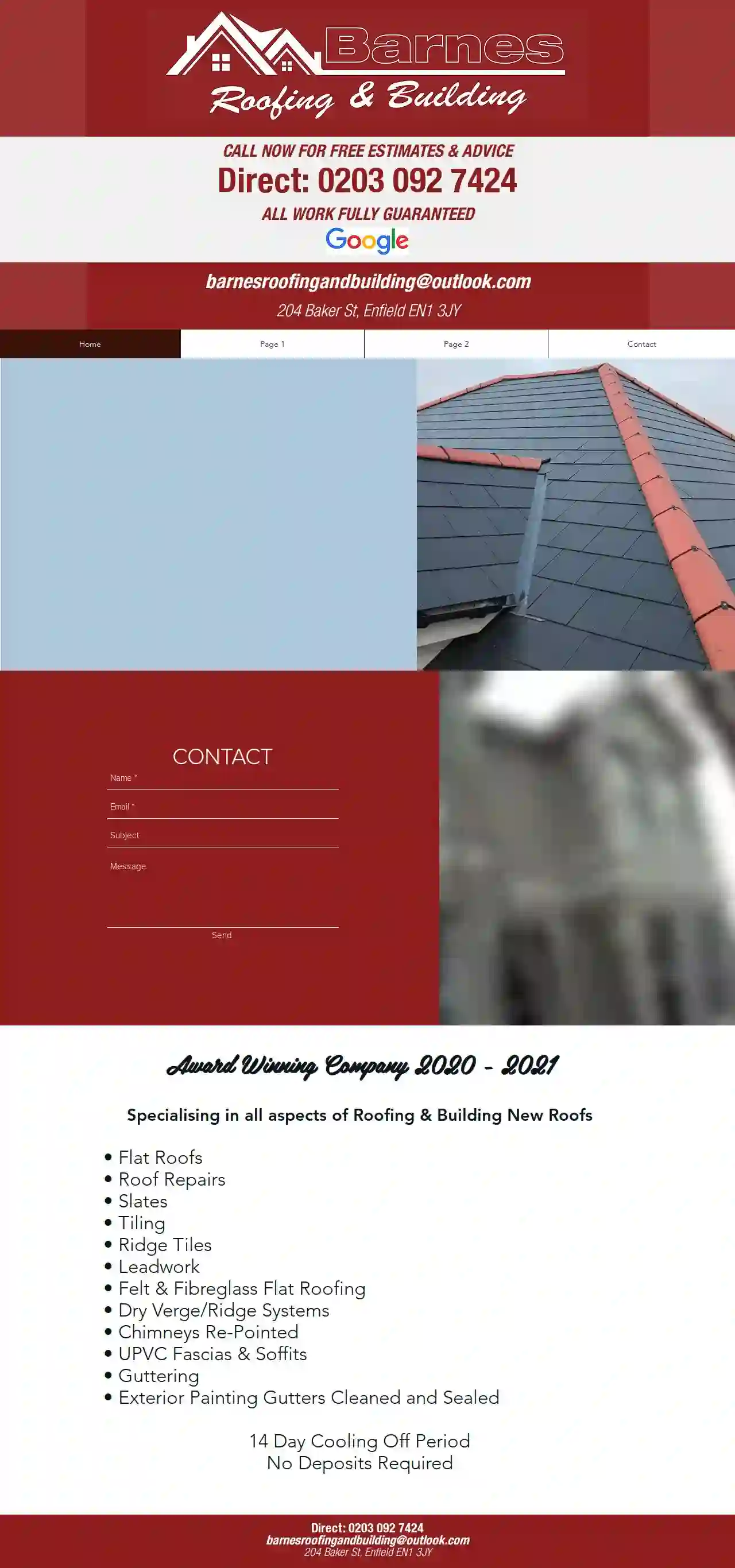Roofing Companies Brixton
Top 10 Roofing Companies in Brixton
Receive 3 FREE Roofing Service quotes for your project today! Compare profiles, reviews, accreditations, portfolio, etc... and choose the best deal.

Barnes Roofing & Building
4.39 reviews204 Baker St, Enfield, EN1 3JY, GBAward Winning Company 2020 - 2021. Specialising in all aspects of Roofing & Building New Roofs. We offer a wide range of services including Flat Roofs, Roof Repairs, Slates, Tiling, Ridge Tiles, Leadwork, Felt & Fibreglass Flat Roofing, Dry Verge/Ridge Systems, Chimneys Re-Pointed, UPVC Fascias & Soffits, Guttering, and Exterior Painting. Gutters Cleaned and Sealed. 14 Day Cooling Off Period. No Deposits Required.
- Services
- Why Us?
- Gallery
Get Quote
London Platforms Roofing - High Level Roof Repair | 24/7 Emergency Roof Repair
4.229 reviews26-28 Burleigh Road, Enfield, EN1 1NY, GBLondon Platforms Roofing is a roofing company that provides a wide range of domestic, commercial, and industrial roofing solutions across London and the Home Counties. We pride ourselves on providing our customers with high-quality roofing services, using our unique fleet of lorries with cherry pickers to reach and fix roofs up to 35 meters high. Our team is passionate about roofs, knowing exactly what it takes to ensure quality and restore trust in the roofing industry.
- Services
- Why Us?
- Accreditations
- Gallery
Get Quote
City Building And Roofing Ltd
3.73 reviewsLondon, GBCity Building and Roofing Ltd. is a building and roofing company based in London. We provide a wide range of services, including new builds, refurbishments, and repairs. Our team of experts is committed to delivering high-quality workmanship and exceptional customer service. With over 10 years of experience, we have built a reputation for being reliable, efficient, and cost-effective. We are fully insured and offer insurance-backed guarantees on all our work. Our services include GRP roofs, three-layer felt systems, roof repairs, new roofs, fascias, soffits, and gutters, roof terraces, Velux roof windows, roof refurbishment, building services, exterior renovation, damp proofing, walls and brickwork, interior renovation, kitchens, and bathrooms.
- Services
- Why Us?
- Accreditations
- Our Team
- Testimonials
- Gallery
Get Quote- E.
E.J. Roberts Roofing Ltd
3.510 reviewsLondon, GB- Services
- Why Us?
Get Quote - Ha
Hamilton Roofing & Building Ltd
4.25 reviewsLondon, GB- Services
- Why Us?
Get Quote - Si
Signature Roofs Ltd
539 reviewsLondon, GB- Services
- Why Us?
Get Quote - LD
LDN Roofing Solutions
3.418 reviewsLondon, GB- Services
- Why Us?
Get Quote - Ad
Admiral Roofing And Building Contractors Ltd
4.211 reviewsLondon, GB- Services
- Why Us?
Get Quote - Do
Dontel Roofing Supplies Ltd
534 reviewsLondon, GB- Services
- Why Us?
Get Quote - Ro
Roofshield London
4.47 reviewsLondon, GB- Services
- Why Us?
Get Quote
Over 12,314+ Roofing Companies onboarded
Our roofing pros operate in Brixton and beyond!
Roofyng.co.uk has curated and vetted Top Roofers in Brixton. Find the most reliable business today.
Frequently Asked Questions About Roofing Companies
- Home Improvement Loans: Offered by banks or credit unions.
- Home Equity Loans or Lines of Credit: Use your home's equity as collateral.
- Government Programs: Check for energy efficiency rebates or grants.
- Contractor Financing: Some roofing companies offer financing plans.
- Age: If your roof is nearing or exceeding its expected lifespan, it's wise to consider replacement.
- Multiple Leaks: Several leaks or leaks that reappear after repairs suggest a widespread problem.
- Extensive Damage: Large areas of damaged, missing, or deteriorated roofing materials might be too costly or difficult to repair effectively.
- Sagging or Structural Issues: Sagging, deflection, or other structural issues indicate a compromised roof that needs replacement.
- Granule Loss (Asphalt Shingles): Significant granule loss indicates weathering and reduced protection.
- Curling or Buckling Shingles: Signifies age or improper ventilation.
- Increased Energy Bills: A poorly insulated roof can lead to higher heating and cooling costs.
How can I get financing for a new roof?
What are the signs that my roof needs to be replaced?
What is fascia, and why is it important?
What is a roof valley, and why is it important?
How can I get financing for a new roof?
- Home Improvement Loans: Offered by banks or credit unions.
- Home Equity Loans or Lines of Credit: Use your home's equity as collateral.
- Government Programs: Check for energy efficiency rebates or grants.
- Contractor Financing: Some roofing companies offer financing plans.
What are the signs that my roof needs to be replaced?
- Age: If your roof is nearing or exceeding its expected lifespan, it's wise to consider replacement.
- Multiple Leaks: Several leaks or leaks that reappear after repairs suggest a widespread problem.
- Extensive Damage: Large areas of damaged, missing, or deteriorated roofing materials might be too costly or difficult to repair effectively.
- Sagging or Structural Issues: Sagging, deflection, or other structural issues indicate a compromised roof that needs replacement.
- Granule Loss (Asphalt Shingles): Significant granule loss indicates weathering and reduced protection.
- Curling or Buckling Shingles: Signifies age or improper ventilation.
- Increased Energy Bills: A poorly insulated roof can lead to higher heating and cooling costs.